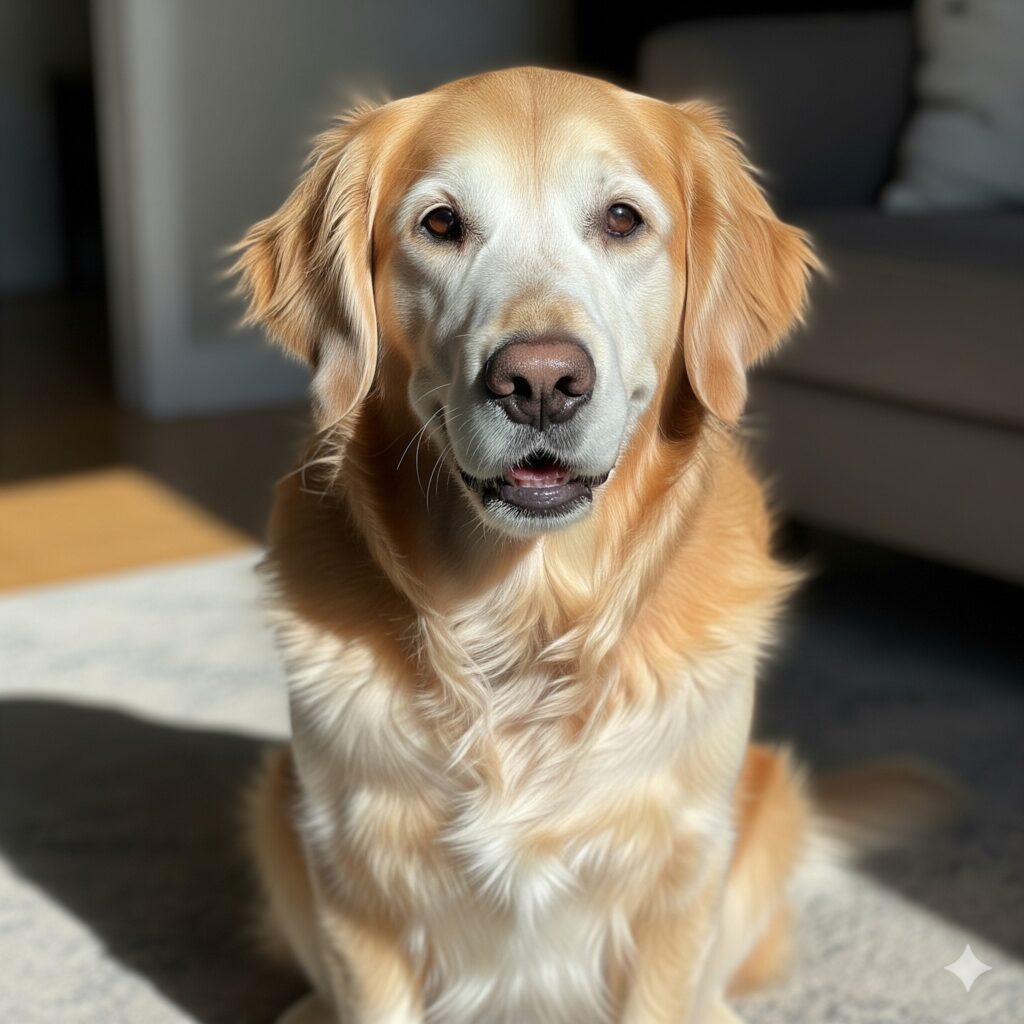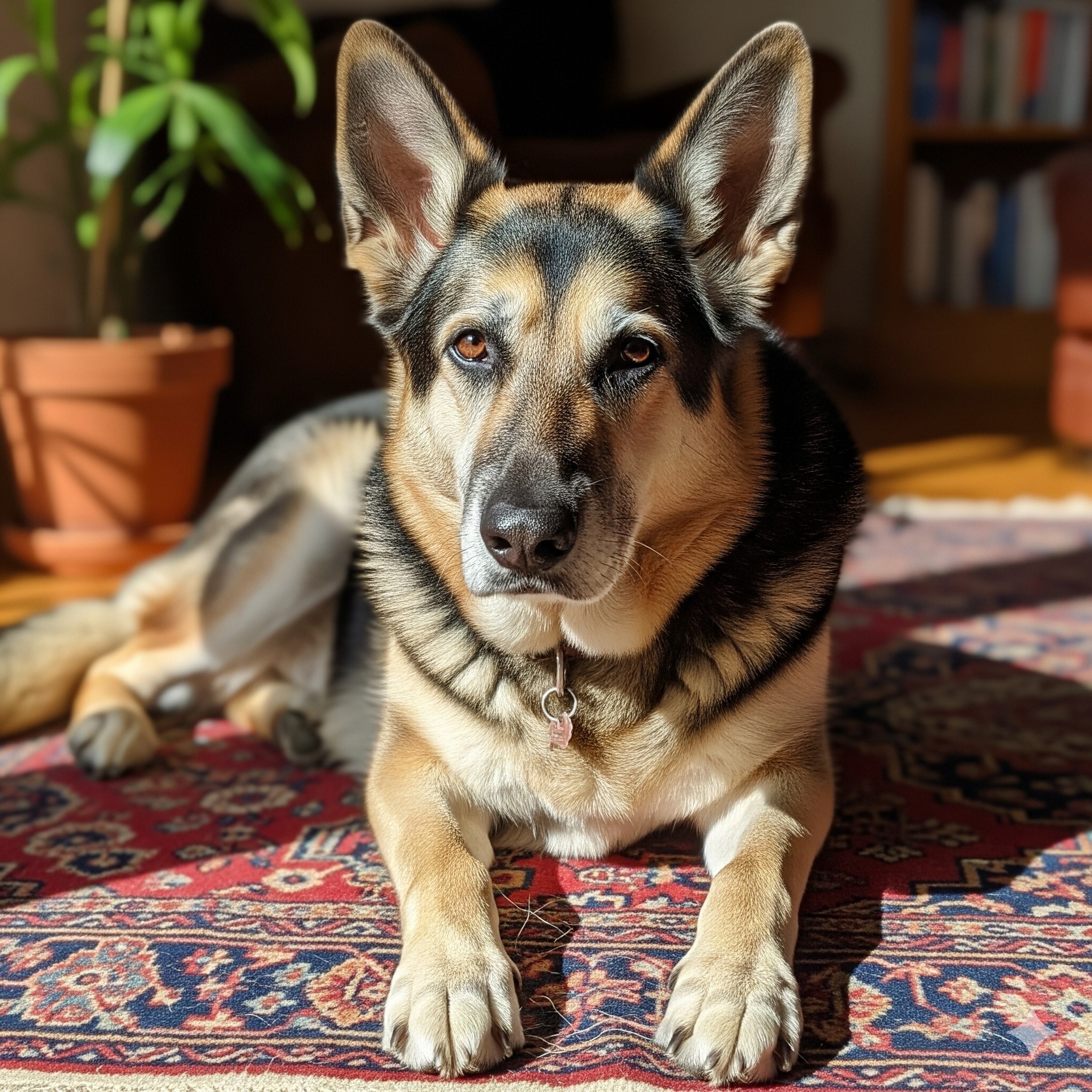Senior Dog Care: A dedicated section for older dogs could cover topics like a changing diet, joint supplements, maintaining mobility, and recognizing signs of age-related diseases.
A Gentle Guide to a Dog’s Last Years
This page offers guidance on navigating the end-of-life journey with your beloved dog. It’s a compassionate resource to help you recognize signs of aging, ensure comfort, and cope with the grief of loss.
A Note of Compassion
This guide is not a substitute for professional veterinary advice. When a dog’s health is declining, only a veterinarian can provide a proper diagnosis and treatment plan. This guide is here to help you prepare and cope.
🐾 Recognizing Signs of Aging
As your dog enters their senior years, you may notice a change in their behavior and health.
Common Indicators:
- **Changes in Mobility:** Difficulty standing up, climbing stairs, or getting into the car. This may be a sign of arthritis.
- **Altered Eating & Drinking:** A loss of appetite or a significant increase in water intake could be signs of underlying health issues.
- **Cognitive Changes:** Confusion, disorientation, increased sleeping, or changes in interaction with the family.
- **Vision & Hearing Loss:** Your dog may no longer respond to commands or may bump into furniture, indicating a decline in senses.
🧓 Senior Dog Care
As your dog ages, their needs will change. A dedicated care plan can help them stay comfortable and healthy in their senior years.
Key Areas of Focus:
- **Changing Diet:** Transition to a senior-specific food, which is often lower in calories to prevent weight gain and contains added nutrients for aging bodies.
- **Joint Supplements:** Talk to your veterinarian about supplements like glucosamine and chondroitin, which can help support joint health and manage arthritis.
- **Maintaining Mobility:** Use non-slip mats on slippery floors, and consider shorter, more frequent walks to keep them moving without overexertion.
- **Regular Vet Check-ups:** Senior dogs should have more frequent veterinary visits to catch age-related diseases like kidney disease, diabetes, or cancer early.
🛏️ Making Your Dog Comfortable
You can help improve your dog’s quality of life in their senior years with a few simple changes.
Practical Steps:
- **Cozy Bedding:** Provide an orthopedic or memory foam bed to support aging joints.
- **Ramps & Steps:** Use ramps to help your dog get on and off furniture or into the car, reducing strain on their body.
- **Gentle Exercise:** Continue with short, gentle walks to maintain muscle tone and mobility.
- **Tailored Diet:** Consult your vet about a diet formulated for senior dogs that supports their changing nutritional needs.
❤️🩹 The Hardest Decision
Deciding on euthanasia is a deeply personal and painful choice. It is made out of love to prevent suffering when a good quality of life is no longer possible.
Key Considerations:
- **Quality of Life:** Evaluate your dog’s daily happiness. Are they still enjoying food, companionship, and favorite activities?
- **Consult Your Vet:** Have an open and honest conversation with your veterinarian about your dog’s prognosis and pain management options.
- **Your Feelings Are Valid:** It is normal to feel overwhelmed, sad, and guilty. This decision is an act of selfless love.
🕊️ Coping with Grief
Losing a pet can be as difficult as losing a human family member. Your grief is real and important.
Ways to Cope:
- **Talk About It:** Share your feelings with friends and family who understand your bond with your pet.
- **Create a Memorial:** Plant a tree, create a photo album, or find another way to honor your dog’s memory.
- **Seek Support:** Consider joining a pet loss support group or speaking with a counselor. You are not alone.
Thank you for giving your dog a life full of love.
Senior Dog Care: Helping Your Best Friend Thrive in Their Golden Years
Think of your dog like a person. Just as people get older, so do our furry best friends. One day they’re a bouncy puppy, and the next, they’re starting to slow down, get a little gray around the muzzle, and sleep a bit more. This is when your dog enters their “senior” years, and just like older people, senior dogs have special needs that are different from when they were young.
This guide is all about senior dog care. We’re going to talk about how you can help your older dog stay healthy, comfortable, and happy. It’s about giving them the best possible life as they get older, showing them extra love and care when they need it most.
When Does a Dog Become a “Senior”?
There’s no single age when every dog becomes “senior.” It mostly depends on their size:
- Small Dogs (like Chihuahuas): Often considered senior around 10-12 years old. They tend to live longer than larger breeds.
- Medium Dogs (like Beagles): Usually senior around 8-10 years old.
- Large Dogs (like German Shepherds): Often senior around 6-8 years old.
- Giant Breeds (like Great Danes): Can be considered senior as early as 5-6 years old.
So, while your small dog might still be zooming around at age 9, a large dog of the same age might already be slowing down quite a bit.
Common Changes You Might See in Your Senior Dog
As your dog gets older, you’ll start to notice some changes. Some are obvious, and some are more subtle. Knowing what to look for can help you catch problems early.
- Slowing Down: They might not run as fast, jump as high, or play as long. Walks might become shorter, or they might prefer to nap more often. This can be a sign of arthritis (joint pain).
- Gray Fur: Especially around their muzzle and eyes. It’s like their hair turning gray!
- Changes in Sleep Patterns: They might sleep more during the day but also get confused or restless at night.
- Weight Changes: They might gain weight because they’re less active, or lose weight if they’re having trouble eating or have a health issue.
- Dental Problems: Older dogs often have more issues with their teeth, like plaque buildup or gum disease, which can make eating painful.
- Eyes and Ears: Their eyesight might get cloudy (this can be cataracts) or they might not hear as well as they used to.
- Potty Accidents: Sometimes older dogs can’t hold their pee or poop as long, or they might forget where to go.
- Confusion or Forgetfulness: They might stare at walls, get lost in familiar places, or seem less responsive. This can be a sign of Canine Cognitive Dysfunction (like Alzheimer’s for dogs).
Diet Changes: What Your Senior Dog Needs to Eat
Just like growing puppies need special food, so do aging dogs. What they ate as a young adult might not be the best for them now.
- Senior Dog Food: Many dog food brands make special “senior” formulas. These foods are usually:
- Lower in Calories: Because older dogs are less active, they need fewer calories to avoid gaining too much weight.
- Easier to Digest: Their tummies might not work as well as they used to.
- Joint Support: Often include ingredients like glucosamine and chondroitin, which help support healthy joints and reduce arthritis pain.
- Extra Fiber: To help with digestion and prevent constipation.
- Watch Their Weight: It’s super important to keep your senior dog at a healthy weight. Too much weight puts extra strain on their joints, heart, and other organs. Your vet can help you figure out the perfect portion size using a dog calorie calculator.
- Softer Food: If your dog has dental problems or is missing teeth, they might struggle with hard kibble. You can try wetting their kibble with warm water or switching to soft, wet food.
Exercise for Senior Dogs: Keep Them Moving Gently
Just because your dog is older doesn’t mean they should stop moving! Exercise is still super important, but it needs to change.
- Shorter, More Frequent Walks: Instead of one long walk, try two or three shorter, slower walks throughout the day.
- Gentle Play: Fetch might be replaced with gentle games or brain puzzles. Avoid intense jumping or running that could hurt their joints.
- Swimming: If your dog enjoys it, swimming can be excellent exercise because it’s easy on their joints.
- Physical Therapy: Your vet might suggest special exercises or even a type of “doggy physical therapy” to help keep their muscles strong.
Making Your Home Senior-Friendly
Think about how you can make your home safer and more comfortable for your aging dog.
- Comfy Beds: Provide soft, orthopedic beds that support their aching joints. Place them in warm, draft-free spots.
- Ramps and Steps: If your dog struggles to get on the couch, bed, or into the car, consider getting a ramp or pet stairs. This reduces strain on their back and legs.
- Non-Slip Surfaces: Hardwood floors or tiles can be slippery. Lay down rugs or non-slip mats in areas where your dog walks often to prevent falls.
- Easy Access to Food/Water: Place their food and water bowls in an easily accessible spot, maybe even raised bowls if bending down is difficult for them.
- Potty Breaks: Since they can’t hold it as long, offer more frequent trips outside. If accidents happen, be patient—it’s not their fault.
Vet Visits: More Important Than Ever!
Regular vet check-ups are always important, but they become even more crucial for senior dogs.
- More Frequent Visits: While young adult dogs might go once a year, senior dogs often need to see the vet every 6 months. This helps catch problems early.
- What the Vet Checks: During senior check-ups, your vet will likely do:
- Thorough Physical Exam: Checking joints, eyes, ears, teeth, and listening to their heart and lungs.
- Blood and Urine Tests: These tests can help find problems like kidney disease, liver issues, or diabetes before you even see symptoms.
- Weight Management: They’ll help you manage your dog’s weight and discuss diet changes.
- Pain Management: If your dog has arthritis, the vet can suggest medications or supplements to help with pain.
Mental Stimulation: Keep Their Brains Busy!
Just like their bodies, senior dogs’ minds need exercise too! This can help prevent or slow down Canine Cognitive Dysfunction.
- Puzzle Toys: Toys that make your dog “work” for a treat are excellent for mental exercise.
- Gentle Training: Even old dogs can learn new tricks! Keep training sessions short and positive. This builds confidence and keeps their brain active.
- New Smells: Take them to new, safe places for walks so they can experience new sights and smells.
Patience and Love: The Most Important Medicine
Caring for a senior dog can sometimes be challenging. They might need more help, have accidents, or not be as playful as they once were. But through it all, remember that they are still the same loving companion who has been by your side for years.
The most important thing you can give your senior dog is patience, understanding, and plenty of love. Enjoy these golden years together, cherishing every moment. You are their world, and your care makes all the difference.
References
- American Veterinary Medical Association (AVMA). (n.d.). “Caring for senior cats and dogs.” Retrieved from https://www.avma.org/resources-tools/pet-owners/petcare/senior-pets
- Cornell University College of Veterinary Medicine. (n.d.). “Choosing food for your senior dog.” Retrieved from https://www.vet.cornell.edu/departments-centers-and-institutes/riney-canine-health-center/canine-health-information/choosing-food-your-senior-dog
- Royal Society for the Prevention of Cruelty to Animals (RSPCA). (n.d.). “Caring for Older Dogs – Senior Dog Care.” Retrieved from https://www.rspca.org.uk/adviceandwelfare/pets/dogs/health/seniordogs
- VCA Animal Hospitals. (n.d.). “Helping our Senior Dogs Age Gracefully.” Retrieved from https://vcahospitals.com/know-your-pet/helping-our-senior-dogs-age-gracefully

